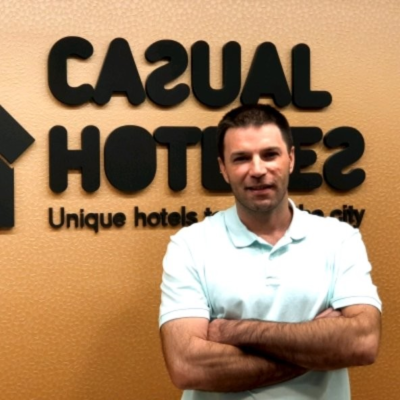Track the Evolution of Your Hotel’s Revenue Management
From the outside in (potential clients, competitors and market demand) and from the inside out (performance, systems and resources). In other words, this is 360˚ revenue management- you analyze the source of income and place the traveler at the center of the strategy.
From a planning point of view, every decision made on the management level influences your revenue management strategy. Hence, why it’s important to analyze each factor one by one and propose actions that are efficient. You shouldn’t be afraid of testing new products and features or improving current ones, since they can help balance bookings and reduce costs.
For a complete vision of your hotel, it’s important to analyze your revenue management department from all angles and monitor how the department has evolved until now and how it will continue to evolve. Here are 8 fundamental elements that will help you follow the evolution of your hotel’s revenue management.
1. From bookings to patterns and spending levels.
In revenue management, there has been a major shift of focus. Managers are now focusing on revenue generated from individual guests rather than the room itself. Your hotel has the ability to generate revenue beyond the guestroom. Revenue managers study potential sources of business and how these sources affect the relationship between hotel and consumer. Identify consumption patterns and determine the most profitable channels. Once you’ve done that, you can use this information to implement strategies that will help you generate more revenue and increase your hotel’s profitability.
2. Decision making based on data rather than intuition.
For a long time, Excel spreadsheets were the easy choice and main tool for revenue managers. However, with the evolution of technology new and improved strategies developed, leading to bigger profits. Integrated technology allows you to process information in real time, share this information with other departments and tailor reports. With a revenue management system, you minimize errors and can determine the best channels for distributing your product. And these are only some of the many benefits that RMS technology offers.
3. Collaboration between departments.
Revenue management is now more integrated into hotel operations than ever before. The revenue management department has also taken the role of mediator, coordinating strategic conflicts between other departments. Be one step ahead of your competitors by continuously analyzing how each decision influences your business. When you have a bird’s eye view of the decisions made between departments, you can be more efficient and make more sensible decisions.
4. Moving past the one size fits all approach.
Over the last decade, unfortunately, revenue management has not received the attention it deserves at many hotel establishments. The revenue management department has had to work with more systems than any other department, such as unreliable extranets, bad integrations and inefficient PMS systems. Additionally, revenue management has had to overcome many difficulties within the discipline itself. Often, revenue managers had to work many hours for results that weren’t always immediately visible. Advances in technology has definitely helped make this department run more efficiently. Now with a simple click, you can make hundreds of rate changes backed by data and analysis that optimize processes.
5. Profitability from management, not discounts.
A revenue strategy cannot be based on discounts. Revenue management can help you identify and determine what drives your hotel’s bottom line. Don’t think about pricing as much this time, but instead focus your marketing efforts on activities and products that generate real value. For this reason, you ought to leave short-term planning aside, and, instead, focus on personalizing your product to consumers.
6. Forecasting based on big data.
For revenue managers, it’s all about being able to forecast accurately. However, a revenue forecast is only as good as the information that goes into it. The more you know about the market and about consumption patterns, the more you’ll be able to reduce errors and simplify decision making. Every hotel needs revenue management, the most effective way to increase your hotel’s profitability.
7. A 360º approach.
Placing your hotel in the market helps you determine which factors make you different and more competitive. Hotels are used to focusing solely on location and factors such as online reputation, services, etc. are often left on the back burner. Analyze the market from many angles to help you cover all your bases and give you a competitive edge.
A revenue manager is never static. Innovation affects many areas such as competitiveness, upgrades, strategy, technology, experience, etc., reason enough to keep an eye on this. Add to your hotel’s competitiveness by obtaining higher results, decreasing costs and using the information provided by the RMS. Travel distribution is determined by product excellence and sophisticated technology, two factors that can make or break your hotel’s success.

















